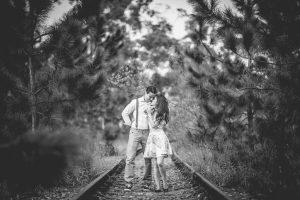First Love: Its Impact on Future Relationships
Love is a rollercoaster of emotions that can be both exhilarating and nerve-wracking. It’s that one feeling that has inspired countless books, songs, and movies because it is universal and makes us feel alive.
But what happens when we fall in love for the first time, and how does it impact our future relationships? In this article, we’ll delve into the science behind falling in love and the ways that first love can impact relationships in the future.
Symptoms of Love and Infatuation
Most of us have been there before. We start seeing someone, and suddenly, we can’t stop thinking about them.
Our heart races every time we see them, and our palms get sweaty as we nervously approach them. You might even feel a little light-headed or giddy with anticipation when you’re around them.
These are all symptoms of love. Infatuation, on the other hand, manifests itself differently.
While love is a gradual process, infatuation is more immediate. You might experience a strong attraction to someone, and these feelings can be intense and overpowering.
You might find yourself obsessing over them, imagining scenarios, and idealizing them. Infatuation is often short-lived and fades away as soon as circumstances change or as you get to know the person better.
Why First Love Has an Impact on Future Relationships
There’s something exceptional about first love, and it can have a lasting impact on future relationships. All the intense feelings that go along with this experience are powerful learning experiences that shape our expectations of relationships in the future.
One of the biggest impacts first love can have on future relationships is the way it shapes our expectations. Many people’s experience for first love is via movies, tv shows, and books.
This can lead individuals to have high expectations for future relationships, which may or may not be realistic. First love can also have an impact on our behavior patterns in future relationships.
We may unconsciously repeat behaviors and patterns that developed during our first love experience. For example, if your first love was possessive, you may be more likely to seek out similar partners in the future.
Falling in Love vs. Future Relationships
Falling in love is different than being in a long-term relationship.
When we fall in love, we feel an intense connection with someone, and we may imagine ourselves being together for the rest of our lives. It’s a surreal and exciting experience that floods us with emotions.
However, the dynamics of a long-term relationship are different. Over time, we learn about our partner’s quirks, and we work to mitigate conflicts and maintain a healthy relationship.
Love in a relationship can be more stable than falling in love, but it might not be as intense as the initial experience.
How First Love Affects Future Relationships
First love can impact future relationships because it significantly shapes our expectations of what our love life should look like. It can be challenging to reconcile the intensity and excitement of first love with the stability that comes with mature relationships.
First love also teaches us what to look for in a partner. We learn from our first love experience how they made us feel, what we liked and disliked, and what traits we admire in a partner.
This learning experience is why first love can be such a valuable experience, even if it doesn’t work out in the long run. In conclusion, first love can have a significant impact on future relationships, and the way we experience it can shape our expectations for the rest of our love life.
It’s a powerful feeling that teaches us more about ourselves and what we want in a partner. Whether or not your first love is with the person you spend the rest of your life with, the experience itself is something that can’t be replicated or replaced.
So cherish the experience, learn from it, and use it to grow as a person. Who knows, it may be the best thing that ever happened to you.
Comparing Future Relationships to First Love
First love is an experience that is hard to forget. It can leave an indelible mark on our hearts, minds, and emotions.
When we start dating later in life or enter into a new relationship, we are often comparing it to that first love experience. We may set unrealistic expectations, fall into repetitive behaviors, or learn valuable lessons.
In this article, we will explore how future relationships compare to first love.
Unrealistic Expectations Based on First Love
First love is a powerful experience that can shape our opinions of what we want in a relationship. It is often characterized by an intense attraction towards your partner, a strong desire to be with them, and a conviction that they are the one for you.
This experience can lead to unrealistic expectations in future relationships. People who have fallen in love for the first time may expect their future relationships to be as intense, full of excitement, and passionate.
These expectations are often unrealistic and can lead to disappointment and heartbreak. A person may have unrealistic expectations in terms of physical attraction, mutual compatibility, and emotional closeness.
It’s crucial to remember that a successful relationship is not just about intense physical attraction and passion but communication, effort, and compromise. People are not perfect and will have unique quirks, personality traits, and differences with their partners.
Repetitive Behavior Patterns from First Love
First love can also contribute to repetitive behavior patterns in future relationships. If we had a positive experience in our first relationship, we may unconsciously try to recreate it.
This behavior can include seeking out similar personality traits or similar physical attraction features in our new partners. Conversely, if our first love experience ended poorly, we may develop trust issues, become more guarded emotionally, or experience abandonment issues in new relationships.
These behavior patterns can lead to difficulties in starting trust and deeper emotional connections with future partners.
Learning What One Wants and What to Avoid from First Love
Despite these challenges, first love can teach us valuable lessons on what we want and what to avoid in future relationships. It can help us identify qualities, attributes, and values we value in a partner.
We learn to appreciate kindness, respect, honesty, and trust in a relationship. Alternatively, first love can also help us determine traits we want to avoid or recognize as early warning signs in a potential partner.
If a past partner was emotionally abusive or possessive, we may have developed a keen sense of awareness to such traits for future partners.
Moving On from First Love
Moving on from first love can be difficult because it often leaves emotional scars, heartbreak, and pain. However, moving on is an essential process to grow and evolve as a person and in future relationships.
Overcoming the Pain of First Love
The healing process after first love involves looking at yourself and the relationship objectively. It may involve accepting that it’s time to move on and learn how to forgive and let go of past hurt.
People can make use of friends, family, or seeking professional help to help overcome their emotional pain.
Learning from Previous Mistakes in Future Relationships
It’s vital to take time to reflect on past mistakes and use them to inform future behaviors. The lessons learned from past relationships, including first love, can inform how you approach future relationships.
For example, you might have learned that trust and communication are essential qualities in a partner and prioritize those in future relationships.
Using First Love as a Lesson for Future Success
First love can be a valuable lesson that can inform future success. It is essential to use those lessons learned to self-growth in future relationships.
Instead of repeating previous mistakes, use them as a vehicle to bring emotional intelligence, maturity, and wisdom to your future relationships. Recognize that first love was a necessary step in your life journey but not a final destination.
In conclusion, first love can impact future relationships in several ways, including setting unrealistic expectations, repetitive behavior patterns, and teaching valuable lessons. Moving on from first love may be challenging, but it provides an opportunity for reflection and growth.
It’s essential to learn from past mistakes and apply those lessons to future relationships. Ultimately, first love may just be the first chapter in a larger book that is your love story.
In conclusion, this article explored the impact that first love can have on future relationships and the ways that it shapes our expectations, behavior patterns, and learning experiences. We dove into the unrealistic expectations and repetitive behavior patterns that first love can leave us with, while also recognizing the valuable lessons that we can learn from it.
Additionally, we covered the importance of moving on from first love and using it as a tool for personal growth in future relationships. First love may be a powerful and emotional experience, but it is only the beginning of a love journey to be explored and learned from in the years to come.



